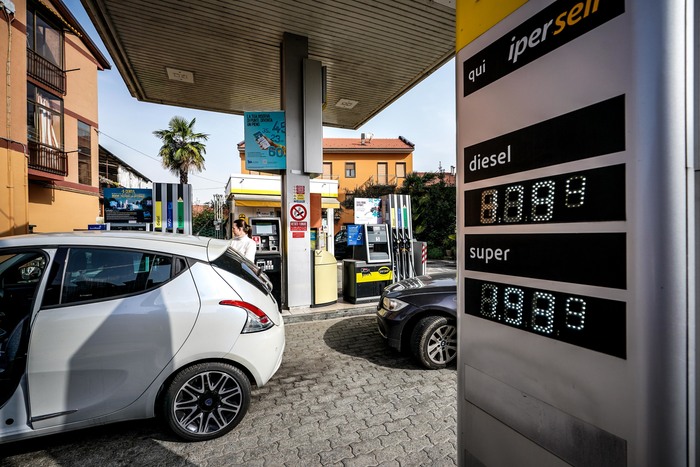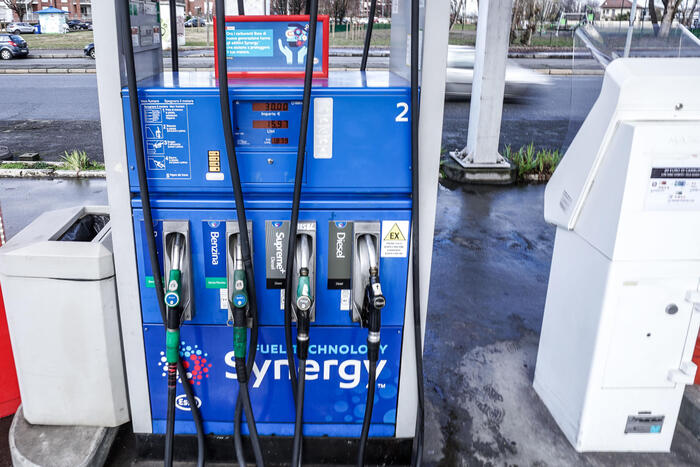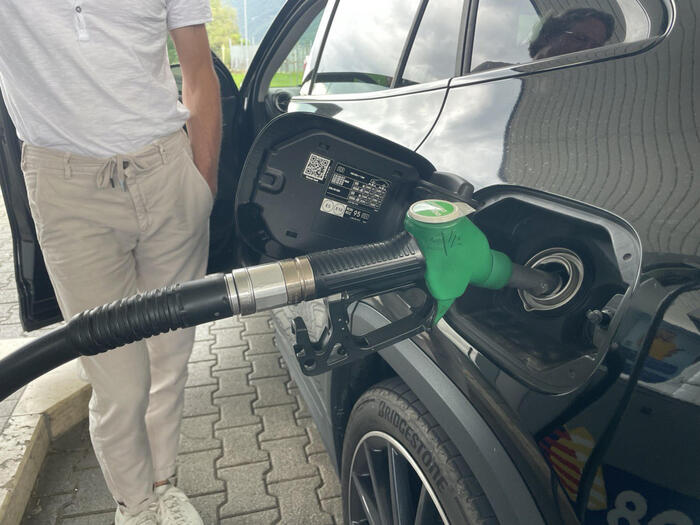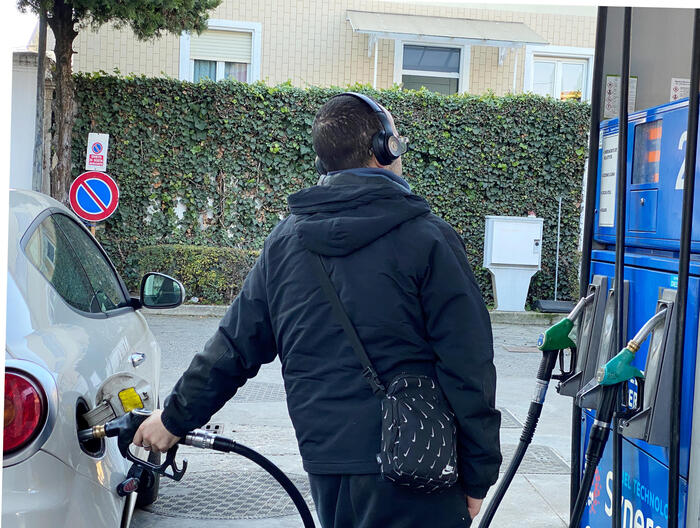Enlarge image
Expensive process: driver refueling his Land Rover
Photo: Jason Alden / Bloomberg via Getty Images
The television images from gas stations near the border in Poland, the Czech Republic and Austria are similar these days.
Cars with German license plates line up at the gas pumps, people fetch canisters from the trunk.
"You save where you can," says a woman into the TV camera.
“Petrol rage”, “Expensive shock”, “Diesel alarm”: This is the soundtrack of fuel tourism in social networks and the tabloid media.
There seems to be a noticeably large number of drivers of SUVs and high-powered cars with high fuel consumption - and correspondingly large tanks - who are drawn abroad to save.
It's less worthwhile for everyone else.
Driving big cars but complaining about high fuel prices - that doesn't really fit into the image of the cost-ridden motorist nation.
And yet this supposed contradiction describes the situation very precisely.
Whoever complains at the gas station is not only a victim of a greedy oil industry or the tax-hungry state.
Some of the reasons are also personal preferences in automobiles and the model policy of a vehicle industry that has relied on heavy fuel guzzlers in recent years.
Just as the first bargain hunters were on their way across the border, the Federal Motor Transport Authority published fresh registration figures.
Thirsty SUVs were the most popular cars between January and September.
Almost half a million were newly registered, an increase of almost 16 percent.
Together with off-road vehicles, the market share is 35.3 percent.
More than every third new car is overweight.
Family vans, on the other hand, come in at three percent and perform worse than mobile homes.
New registrations of mini and large vans fell by more than a quarter in 2021.
"The cars are not only getting bigger and heavier, but also more powerful," says Constantin Hack from the Auto Club Europa (ACE).
"What can definitely have advantages with electric cars, for example through better energy recovery with more powerful engines, usually only has disadvantages in terms of consumption with combustion engines."
It is this homemade trend that makes the price increase at the petrol station really annoying and ignites the "petrol madness".
Still-Transport Minister Andreas Scheuer calls for a "fuel price brake", CSU and Left Party discover overlaps.
Trade unions and business associations are also jointly sounding the alarm.
Higher, faster, harder
Almost three quarters of Germans would like relief from gasoline and diesel prices, according to a survey.
In fact, diesel is more expensive than ever.
After an all-time high at the beginning of the week, things continued to improve, so that the record was broken again a few days later.
A liter costs just 1.56 euros on average, petrol is 1.71 euros.
At some motorway petrol stations, the price has cracked the two-euro mark at times.
Above all, the increase was brought about by the price of crude oil, which has recently been quoted as high as it has been for years.
The stronger dollar also has an impact because oil is traded in US currency.
The fact that there is dramatic talk of “exploding” fuel costs may also have something to do with the fact that refueling was initially extremely cheap during the pandemic.
Barely a year passed between lows and highs.
Old and new tips for saving fuel are making the rounds.
Drive with foresight, shift up a gear earlier, make sure the tire pressure is correct, switch off the auxiliary heating - and do not drive short distances at all.
The ADAC recommends that refueling in the evening is cheaper than in the morning.
Apps like "clever-tanken", which compare gas station prices, are booming.
None of this solves the basic problem of SUVs weighing tons.
The anti-aerodynamic height and the additional weight take a toll at the gas station.
Additional horsepower also undermines advances made by engineers in engine efficiency.
All of this applies not only to SUVs: the current Golf 8 is also around half a meter longer and almost 20 centimeters wider than its ancestor.
The average engine in a new car now provides 20 percent more power than ten years ago, and its weight has increased by 140 kilograms.
This increases the petrol station bill permanently.
This is shown by an exemplary comparison between heavy and light cars and more or less powerful engines.
Even with 13,500 kilometers driven per year, which roughly corresponds to the average mileage, the differences in current fuel prices add up to hundreds of euros per year:
The 3 Series BMW, a bestseller, is available with 136 hp or 374 hp.
The larger model goes hand in hand with an increase in weight of 330 kilograms and a 1.7 liter increase in fuel consumption per 100 kilometers.
For the average driver, this makes a surcharge of almost 400 euros at the gas station.
The VW Tiguan, the best-selling car in its segment, is one of the smaller city SUVs.
Nevertheless, it weighs 125 kilograms more than a Golf station wagon, which offers a similar amount of space on the seats and in the trunk.
For its elevated seating position, the Tiguan driver pays more than 250 euros more for diesel than for the Golf.
The Mercedes GLC, an SUV, has a much smaller trunk than the C-Class station wagon, but weighs 190 kilograms more.
Equipped with similar engines, the GLC consumes around a fifth more diesel, which on balance costs an additional 230 euros.
An Opel Crossland has a lot less storage space than an Astra station wagon.
Because of the additional weight, the small SUV consumes even more than an Astra with a significantly more powerful engine.
Less space, weaker engine - but a fuel bill that is 230 euros more expensive in the model calculation.
With cars like the Toyota Corolla or the much older Audi A2, drivers with the same mileage save around 500 euros per year compared to small SUVs and more powerful cars (see table below).
Station wagons seem to be out and small cars are neglected by the corporations.
Cars that use less than five liters per 100 kilometers drove decades ago.
Fuel saving did not fail because of the technology.
However, manufacturers and customers took other paths.
Now drivers get the bill.
Many families are in trouble
Big horsepower showers are more lucrative and sell better as new cars.
Vehicles trimmed for efficiency such as the aluminum Audi A2 or VW Lupo, on the other hand, are no longer produced at all.
They are only available as used ones.
This is one of the reasons why many drivers are moaning all the more about rising fuel prices.
"What we observe: When it comes to new cars, they often don't look very closely at consumption," says ACE expert Hack.
Brand-new vehicles are initially often company or rental cars or are aimed at a well-funded clientele.
"That is why one liter more or less often does not matter in many new cars."
Many families are in trouble, for whom cars only become affordable when they are used.
Economical models such as the Lupo and A2 are popular there, too, which as new cars have hardly found favor with high-income earners and companies.
However, their small numbers make them expensive - a socio-ecological dilemma.
The fuel guzzlers of today are the used cars of tomorrow - and the larger their registration numbers, the more affordable they become over the years.
Then the cost-conscious family also turns to the disproportionate cars - and has to take the gasoline and diesel prices as they come.
The dilemma is also evident in family-friendly electric cars, which are often barely affordable despite the bonus, which is why the actual breakthrough is still a long time coming - until there are enough used electric cars.
In the meantime, many people remain tied to their fuel guzzlers - including petrol madness.













